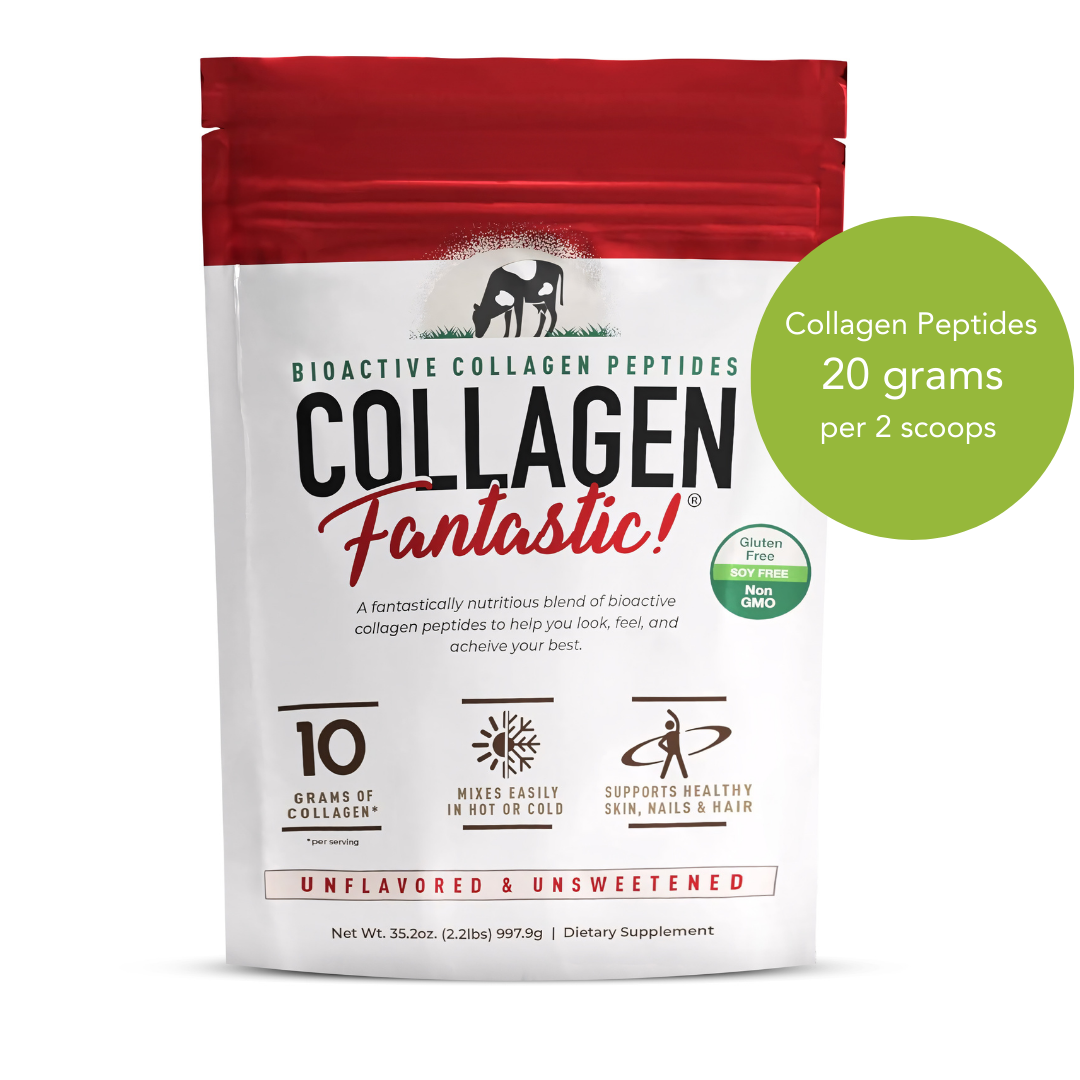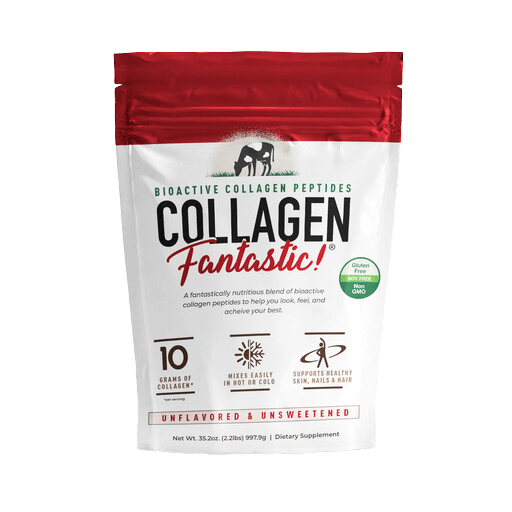Collagen vs. Whey Protein: Which Is Right for You?
Whenever you have a choice between two options, it can drive you crazy trying to make a final decision. You go back and forth in your mind, afraid you’ll regret whatever choice you make. Case in point: collagen vs. whey protein.
Do you go with the tried and true whey protein supplement, widely known for its muscle-building capabilities? Or do you see what all the hype’s about with collagen and give it try?
We'll help you decide between collagen and whey protein so you can choose the right supplement for you.

What Is Whey Protein?
Don’t you just hate when this happens? You go to open your usual cup of morning yogurt and some watery gunk flies out and spills all over your desk.
That goopy-looking substance is whey. According to Mayo Clinic, whey protein comes from the cheese-making process. It’s one of the two main proteins (in addition to casein) found in dairy products.
Typically, you’ll find whey in protein powder form. It can be used to make protein shakes, smoothies, or blended together with soft foods. In fitness and bodybuilding circles, whey has become a go-to for building muscle, burning fat, and making strength gains in the gym. Because it’s a fast-absorbing protein, your body can put it to use quickly so you can reap all the benefits right away.
Benefits of Whey
There are many benefits of adding whey protein to your diet. Here are some important ones:
1. It’s a Complete Protein Source
Whey contains all 9 essential amino acids, which makes it a complete protein source. Amino acids are the building blocks of all protein, They give your body energy, provide immune system support, and they’re instrumental for muscle growth and helping your body recover in between workouts.
2. Your Body Absorbs Whey Quickly
Like we talked about earlier, whey is a fast-digesting protein. That means your body can use protein quickly for processes like protein synthesis. Working out—especially weightlifting—tears your muscles down. Through protein synthesis, your body works to create new protein to repair damaged muscle fibers from your workouts and grow back stronger.
3. Whey Helps You Build Muscle
Whey also contains specific amino acids known as BCAA’s (branched-chain amino acids). BCAA’s are important amino acids that help you build muscle, perform better in the gym, and they also aid in workout recovery.
One BCAA that whey is particularly high in is leucine, which produces growth hormone. Growth hormone makes muscle-building easier. And having more muscle only enhances the amount of fat you can burn. In fact, research shows that—when combined with strength training—whey protein can help increase lean body mass. In other words, that means more muscle and less fat.

4. It’s Good for Weight Loss Too
Not only can it help you build muscle, but whey protein is good for weight loss too. One systematic review found that substituting other foods with whey protein and lifting weights resulted in 8 pounds of weight loss on average. It also showed an increase in lean muscle mass for the study’s participants.
5. It Can Lower Your Blood Pressure and Reduce Inflammation
One meta-analysis study found that taking 20 grams of whey protein or more per day greatly reduced C-reactive protein, which is a fundamental indicator of inflammation in the body.
Another scientific review not only showed that whey protein can help reduce inflammation, but it was also beneficial in addressing a variety of other health issues, including lowering blood pressure.
6. It Can Help With Type 2 Diabetes
Research suggests that whey protein may help in managing type 2 diabetes. In fact, one study found that taking whey protein with a high-carb meal helped regulate blood sugar in people with type 2 diabetes.
Check out Whey Fantastic!
What Is Collagen?
The shiny new toy on the market lauded for keeping your hair, nails, and skin healthy is collagen. Collagen is the most abundant protein in your body. Around 30% of your body's protein is made from collagen. You might have heard it referred to as collagen peptides or collagen hydrolysate but it’s all the same thing.
Collagen comes from the Greek word “glue,” which definitely fits because it plays a major role in the strength of your body’s connective tissues for your bones, ligaments, muscles, and joints. Similar to whey, collagen comes from amino acids. It contains 8 out of the 9 essential ones (the amino acid missing from collagen is tryptophan). It’s worth noting that you probably get plenty of tryptophan from your standard diet.
Collagen also includes three amino acids that you typically won’t find in whey or plant-based protein supplements. Those three are glycine, proline, and hydroxyproline.
Your body creates collagen on its own, but around age 30, you start to produce less and less. Over time, your body’s decline in collagen might show up in the form of wrinkled skin, frail bones, or a loss of mobility in your joints.
To offset your body’s collagen decline, you can:
- Eat foods that are high in collagen (i.e. fish, chicken, egg whites, berries, or leafy greens).
- Take a collagen supplement, such as our Collagen Fantastic.
- Fill up on foods high in Vitamin C (like oranges, kiwifruit, red or green bell peppers), which can help with your body’s collagen production.
Benefits of Collagen
Collagen has been a hit on the health and wellness market. And for good reason too. Here are a few of the benefits:

1. Turn Back the Clock With Youthful-Looking Skin
Does having smooth, healthier-looking skin make you feel more youthful? A collection of studies published in the Journal of Drugs in Dermatology found that collagen supplements can improve skin hydration, elasticity, and density.

2. Collagen Keeps Your Bones Strong and Healthy
Bone density is important for guarding against sprains, fractures, and breaks. Not only that but having healthy bones enable you to walk around and function freely in day-to-day life. As you age, your bones will begin to break down. You may even experience bone loss as early as age 50. For women, this typically happens right around menopause.
A study published in Nutrients showed the benefit of taking collagen for your bones. Over the 12-month study, post-menopausal women saw improvements in bone density by taking collagen peptides.
3. It Can Help With Brittle Nails
Brittle nails aren’t any fun. When your nails are always peeling, breaking, or just looking worn down and ragged, it’s not a good feeling. Luckily, research shows that collagen can help with that.
In one 24-week study, participants saw a nail growth rate of 12% and a 42% decrease in the frequency of broken nails from taking collagen. Overall, 80% of the study’s participants said that taking collagen improved how their nails looked and were happy with the results.
4. Promotes Healthier Joints
Collagen is responsible for keeping your cartilage intact, which cushions your joints. As you’ve learned—with age comes a decline in collagen—and that increases your risk for developing degenerative joint disorders like osteoarthritis.

But research shows that collagen can help with your joints. A review of studies found that, on average, taking just 10 grams of collagen per day over 24 weeks resulted in greater joint mobility for participants. They also reported less joint pain.
5. You Can Build Lean Muscle With Collagen
In the collagen vs. whey debate, it’s often thought that only whey can help you build muscle. And while collagen isn’t a complete protein (it has 8 out of the 9 essential amino acids), you can definitely still build muscle with it.
According to a 2015 study in the British Journal of Nutrition, collagen—when combined with a resistance training plan—improved body composition (increased muscle mass and decreased body fat) more than those people who just did strength training alone without any supplementation.
6. Collagen Is Dairy-Free
Since collagen doesn’t come from milk (typically, you get collagen from animal sources, like cows or fish), it’s a great option if you have a dairy allergy, are lactose intolerant, or just prefer to avoid dairy.
Check out Collagen Fantastic!

Collagen vs. Whey Protein: Which One Should You Go With?
Settling the collagen vs. whey debate depends on your health goals. Are you chasing muscle gains, looking to boost your metabolism, and burn stubborn belly fat? Whey protein might be the best choice for you.
On the other hand, if your main focus is on the beauty side of things—like improving your hair, skin, or nails—then collagen may be the right pick. It also might be ideal for you if you’re looking for joint support or have a dairy allergy.
At the end of the day, try to think of collagen vs. whey protein as less like a competition and more like two protein supplements that complement each other. You can get the best of both worlds by making room for each one in your diet.
Don't miss out on our exclusive offer from Whey Fantastic and Collagen Fantastic to get 20% off on your next order by using the code below!
FNBLOG20
References:
https://medlineplus.gov/ency/article/002222.htm
https://pubmed.ncbi.nlm.nih.gov/16365087/
https://pubmed.ncbi.nlm.nih.gov/24015719/
https://pubmed.ncbi.nlm.nih.gov/24724774/
https://pubmed.ncbi.nlm.nih.gov/25671415/
https://www.ncbi.nlm.nih.gov/pmc/articles/PMC3393628/
https://www.ncbi.nlm.nih.gov/pmc/articles/PMC4620107/
https://pubmed.ncbi.nlm.nih.gov/16002802/
https://pubmed.ncbi.nlm.nih.gov/30681787/
https://pubmed.ncbi.nlm.nih.gov/29337906/
https://pubmed.ncbi.nlm.nih.gov/28786550/
https://www.mayoclinic.org/diseases-conditions/osteoarthritis/symptoms-causes/syc-20351925
https://pubmed.ncbi.nlm.nih.gov/30368550/
https://www.ncbi.nlm.nih.gov/pmc/articles/PMC4594048/
Author Byline:
Chad Richardson is a freelance writer from Cincinnati, OH. He enjoys creating content that helps people get in shape and live healthier lives. When he’s not behind his computer, you can find Chad at the gym, out with friends, or being a homebody binging on Netflix.
You can learn more about Chad on his business website here.















